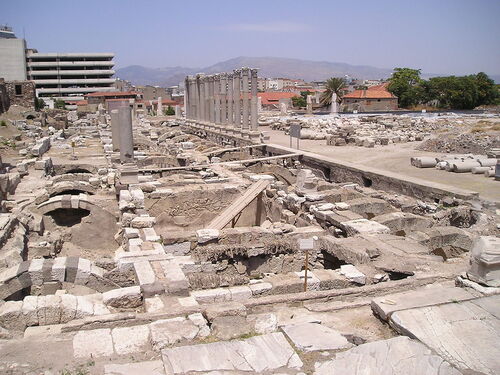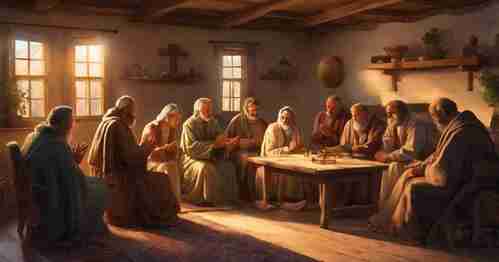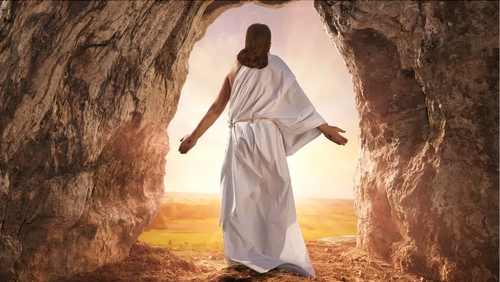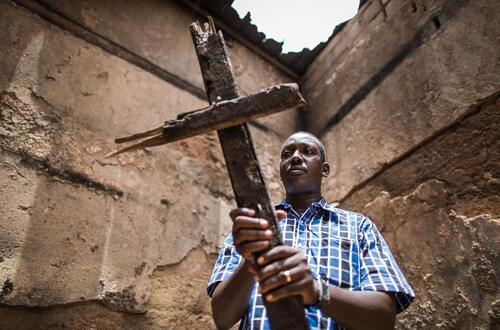Faithful in Suffering: Jesus' Message to the Church in Smyrna
A Letter to the Suffering Church

In the book of Revelation, Jesus addresses seven churches in Asia Minor, each with a unique message tailored to their specific circumstances. Today, we're exploring His powerful words to the church in Smyrna - a congregation experiencing intense persecution and poverty, yet receiving no rebuke from the Lord, only encouragement and promises.
"And to the angel of the church in Smyrna write: 'The words of the first and the last, who died and came to life. I know your tribulation and your poverty (but you are rich) and the slander of those who say that they are Jews and are not, but are a synagogue of Satan. Do not fear what you are about to suffer. Behold, the devil is about to throw some of you into prison, that you may be tested, and for ten days you will have tribulation. Be faithful unto death, and I will give you the crown of life. He who has an ear, let him hear what the Spirit says to the churches. The one who conquers will not be hurt by the second death.'" (Revelation 2:8-11, ESV)
This message speaks powerfully across the centuries to anyone facing opposition for their faith, offering eternal perspective and the promise of ultimate victory to those who remain faithful.
"And to the angel of the church in Smyrna write: 'The words of the first and the last, who died and came to life. I know your tribulation and your poverty (but you are rich) and the slander of those who say that they are Jews and are not, but are a synagogue of Satan. Do not fear what you are about to suffer. Behold, the devil is about to throw some of you into prison, that you may be tested, and for ten days you will have tribulation. Be faithful unto death, and I will give you the crown of life. He who has an ear, let him hear what the Spirit says to the churches. The one who conquers will not be hurt by the second death.'" (Revelation 2:8-11, ESV)
This message speaks powerfully across the centuries to anyone facing opposition for their faith, offering eternal perspective and the promise of ultimate victory to those who remain faithful.
The Golden City of Smyrna

Known as "the crown of Asia" or "the ornament of Asia," Smyrna was a magnificent city located about 35 miles north of Ephesus on the western coast of what is now Turkey. Carefully planned and constructed around 300 BC, the city boasted organized streets, including the famous "Golden Street" that connected the temples of Zeus and Cybele. With its protected harbor, Smyrna flourished as a commercial center, featuring impressive structures including a stadium, library, and one of Asia Minor's largest theaters.
The name "Smyrna" itself carries significance - derived from the Greek word for myrrh, a fragrant spice used in burial preparations. Notably, myrrh had to be crushed to release its fragrance, serving as a poignant metaphor for this suffering church.
Smyrna took particular pride in its loyalty to Rome, even winning the privilege of building a temple to Emperor Tiberius in 26 AD. This devotion to emperor worship would later become a significant source of conflict for Christians who refused to proclaim "Caesar is Lord."
The name "Smyrna" itself carries significance - derived from the Greek word for myrrh, a fragrant spice used in burial preparations. Notably, myrrh had to be crushed to release its fragrance, serving as a poignant metaphor for this suffering church.
Smyrna took particular pride in its loyalty to Rome, even winning the privilege of building a temple to Emperor Tiberius in 26 AD. This devotion to emperor worship would later become a significant source of conflict for Christians who refused to proclaim "Caesar is Lord."
A Church Under Pressure

While we don't have a biblical record of the church's founding, it likely resulted from Paul's ministry in Ephesus, which Acts 19:10 tells us impacted "all the residents of Asia." By the time Revelation was written (around 95 AD), the church in Smyrna faced immense challenges:
The church's faithfulness would later be exemplified by Polycarp, a disciple of John, who was martyred in Smyrna around 155 AD at age 86, demonstrating the ongoing persecution this community faced.
- Economic Hardship: Christians were often excluded from commercial opportunities due to their refusal to participate in trade guilds (which required allegiance to patron deities) and their rejection of emperor worship.
- Social Ostracism: Believers were marginalized as societal outcasts for refusing to participate in pagan festivals that permeated daily life.
- Roman Persecution: Their refusal to acknowledge Caesar as divine often led to imprisonment, property confiscation, and sometimes execution.
- Jewish Opposition: Smyrna had a large Jewish population who sometimes reported Christians to Roman authorities, seeing the new faith as a threat to their protected religious status.
The church's faithfulness would later be exemplified by Polycarp, a disciple of John, who was martyred in Smyrna around 155 AD at age 86, demonstrating the ongoing persecution this community faced.
Jesus Glorified: The Eternal Victor Over Death

"The First and the Last"
This self-description draws directly from Old Testament language used exclusively for God:
"Thus says the LORD, the King of Israel and his Redeemer, the LORD of hosts: 'I am the first and I am the last; besides me there is no god.'" (Isaiah 44:6)
By claiming this divine title, Jesus declares His eternal nature—He existed before all things and will continue to exist after all things. This eternality contrasts starkly with the temporary nature of the Smyrnan Christians' suffering.
For believers experiencing tribulation, this revelation offers profound comfort: Their suffering, though intense, is temporary; their Lord, however, is eternal. Their persecutors might appear powerful in the moment, but they are merely transient figures in the grand scope of history that Christ oversees.
"Thus says the LORD, the King of Israel and his Redeemer, the LORD of hosts: 'I am the first and I am the last; besides me there is no god.'" (Isaiah 44:6)
By claiming this divine title, Jesus declares His eternal nature—He existed before all things and will continue to exist after all things. This eternality contrasts starkly with the temporary nature of the Smyrnan Christians' suffering.
For believers experiencing tribulation, this revelation offers profound comfort: Their suffering, though intense, is temporary; their Lord, however, is eternal. Their persecutors might appear powerful in the moment, but they are merely transient figures in the grand scope of history that Christ oversees.
"Who Died and Came to Life"
The second part of Christ's self-description speaks directly to His redemptive work and resurrection power. For a church facing the threat of martyrdom, this identity carries special significance. Jesus isn't claiming to have survived a near-death experience; He declares He has conquered death itself.
For the believers in Smyrna who lived with the daily possibility of execution for their faith, this provided:
For the believers in Smyrna who lived with the daily possibility of execution for their faith, this provided:
- Assurance of His understanding: Jesus had experienced death itself. He could empathize with their fear and pain.
- Guarantee of resurrection: His resurrection served as the firstfruits and promise of their own future resurrection (1 Corinthians 15:20-23).
- Demonstration of His power: The One who conquered death possesses authority over everything the Smyrnan Christians feared.
- Validation of His divinity: Rising from the dead confirmed all His claims about His identity and authority.
The Divine Paradox: "Poor Yet Rich"

Jesus begins His message with powerful words of recognition: "I know." The Greek word used here suggests complete, intimate knowledge—not just awareness but deep understanding from personal involvement.
Christ acknowledges three specific aspects of their suffering:
Yet in the midst of acknowledging their destitution, Jesus inserts a striking statement: "but you are rich." This powerful paradox reverses worldly values and redefines true prosperity. Though materially impoverished, these believers possessed:
This creates a striking contrast with the church in Laodicea (Revelation 3:17), which boasted of material wealth while being spiritually destitute.
Christ acknowledges three specific aspects of their suffering:
- Tribulation (θλῖψιν, thlipsin): This describes intense pressure or crushing weight. In ancient times, it referred to extracting juice from grapes by placing them under heavy stones. Life itself felt crushing to these believers.
- Poverty (πτωχείαν, ptōcheian): This term describes absolute destitution—the condition of a beggar with nothing. Their extreme poverty likely resulted from property confiscation, job loss, economic boycotts, family rejection, and exclusion from trade guilds.
- Slander from certain members of the Jewish community who actively opposed Christians through accusations to Roman authorities.
Yet in the midst of acknowledging their destitution, Jesus inserts a striking statement: "but you are rich." This powerful paradox reverses worldly values and redefines true prosperity. Though materially impoverished, these believers possessed:
- Rich in faith: "Has not God chosen those who are poor in the world to be rich in faith and heirs of the kingdom?" (James 2:5)
- Rich in spiritual treasures: They possessed "treasures in heaven, where neither moth nor rust destroys and where thieves do not break in and steal" (Matthew 6:20)
- Rich in eternal perspective: Their suffering had cultivated focus on eternal values
- Rich in divine promises: They held the assurance of resurrection and eternal life
This creates a striking contrast with the church in Laodicea (Revelation 3:17), which boasted of material wealth while being spiritually destitute.
Facing the Future With Faith

Having acknowledged their present suffering, Jesus turns to what lies ahead: "Do not fear what you are about to suffer." These aren't empty platitudes from a distant deity but words of encouragement from One who Himself endured the cross.
With divine foreknowledge, Christ warns that more trials are coming:
Yet rather than promise immediate deliverance, Jesus calls for steadfast faithfulness: "Be faithful unto death, and I will give you the crown of life."
The Greek word for "crown" here is στέφανος (stephanos), referring not to a royal crown but to the victor's wreath given to athletes who prevailed in competition. In a city famous for its athletic games, this imagery would resonate powerfully. The promise is clear: those who remain faithful, even to the point of martyrdom, will receive the ultimate prize—eternal life with Christ.
The passage concludes with the assurance that "the one who conquers will not be hurt by the second death"—a promise that though their bodies might be killed, their souls are eternally secure.
With divine foreknowledge, Christ warns that more trials are coming:
- Some would be imprisoned
- Their faith would be tested
- The tribulation would last "ten days" (likely symbolizing a defined, limited period)
Yet rather than promise immediate deliverance, Jesus calls for steadfast faithfulness: "Be faithful unto death, and I will give you the crown of life."
The Greek word for "crown" here is στέφανος (stephanos), referring not to a royal crown but to the victor's wreath given to athletes who prevailed in competition. In a city famous for its athletic games, this imagery would resonate powerfully. The promise is clear: those who remain faithful, even to the point of martyrdom, will receive the ultimate prize—eternal life with Christ.
The passage concludes with the assurance that "the one who conquers will not be hurt by the second death"—a promise that though their bodies might be killed, their souls are eternally secure.
Application: Faithful When It Costs

While most Western Christians don't face the severe persecution experienced by the church in Smyrna, believers worldwide continue to suffer for their faith. The message to Smyrna offers timeless principles for all followers of Christ:
The suffering church at Smyrna reminds us that our faith is not measured by comfort but by faithfulness—not by what we have but by what we're willing to sacrifice for Christ. In a culture increasingly hostile to biblical values, their example challenges us to count the cost and remain steadfast.
As we face our own trials, whether great or small, may we hear the words of Jesus echoing through the centuries: "Be faithful unto death, and I will give you the crown of life."
- Remember who Jesus is: His eternal nature and victory over death provide the foundation for facing any trial.
- Know that He knows: Nothing we endure escapes His notice or understanding.
- Recognize true wealth: Material prosperity pales in comparison to spiritual riches.
- Expect opposition: Christianity has never promised an easy path, only a meaningful one.
- Maintain eternal perspective: Temporary suffering cannot compare to eternal glory.
- Stay faithful to the end: The crown awaits those who persevere.
The suffering church at Smyrna reminds us that our faith is not measured by comfort but by faithfulness—not by what we have but by what we're willing to sacrifice for Christ. In a culture increasingly hostile to biblical values, their example challenges us to count the cost and remain steadfast.
As we face our own trials, whether great or small, may we hear the words of Jesus echoing through the centuries: "Be faithful unto death, and I will give you the crown of life."
Posted in Revelation Bible Study
Recent
Yes, Jesus Was Pierced With Nails (And Why It Matters)
April 21st, 2025
Faithful in Suffering: Jesus' Message to the Church in Smyrna
April 10th, 2025
When Love Grows Cold: The Ephesian Warning
April 5th, 2025
The Majestic King: A Glimpse of Christ's Glory
March 26th, 2025
Devotional - The Eternal Love of Christ - Revelation 1:4-6
March 19th, 2025
Archive
2025
March

No Comments